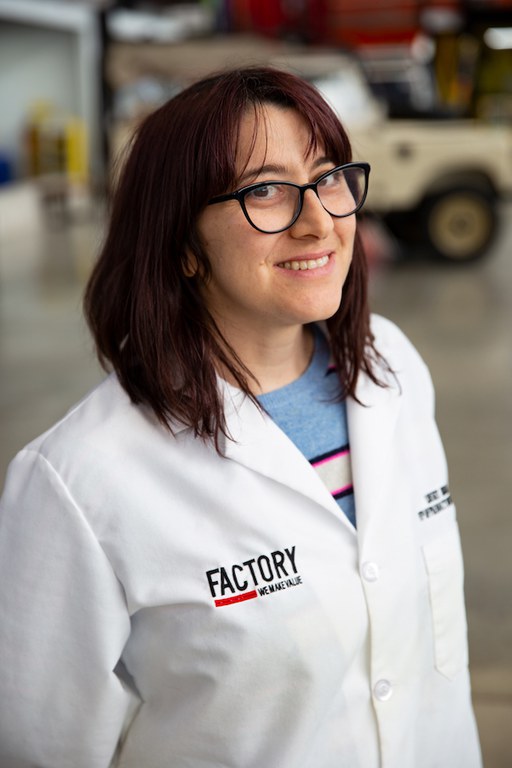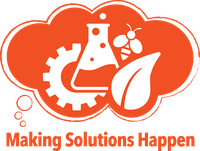Posted: March 5, 2020
UPDATE: Linsey Herman, head of the innovation lab at Factory LLC, will be a judge for the final round of Ag Springboard April 1. The final pitching and judging will be held via video conference. The Ag Springboard awards banquet — which Herman was to keynote — has been postponed to the fall semester. Read about Herman's projects with College of Ag Sciences food science students and Pipcorn, a Factory partner who was featured on Shark Tank.

Linsey Herman has helped create and commercialize more than 300 new food products over 16 years — including a new product for Pipcorn, a startup featured and funded by TV’s Shark Tank. She'll share insights about how entrepreneurs can build a culture of success at the 2020 Ag Springboard Awards Banquet.
Linsey Herman has helped create and commercialize more than 300 new food products over 16 years — including a new product for Pipcorn, a startup featured and funded by TV's Shark Tank.
Herman will be a judge in the final round of Ag Springboard April 1, which will be held virtually.
Ag Springboard is a student business pitch contest in the agricultural sciences with a $7,500 grand prize and $2,500 second prize. (Like Shark Tank for Penn State ag sciences students.)
Student teams submit short video pitches in the first round. Judges select finalist teams, that will pitch their business ideas to a panel of judges throughout Wednesday, April 1.
Herman, Vice President of product development for Factory LLC, a food, beverage, and pet product investor and accelerator in Bethlehem, Pa., heads up R&D and new product development for a number of the firm's brands.
“We make value" is Factory's tagline. Its model is to acquire equity in high-potential food, beverage and pet health companies then partner with them to “rapidly build value."
Factory's team of 41 operators are experienced in various aspects of the food industry such as supply chain, marketing, packaging and graphic design.
"We are so pleased that Linsey agreed to be our Ag Springboard speaker," said Dr. Dan Azzara, Director of Entrepreneurship & Innovation and Alan R. Warehime Professor of Agribusiness at the College of Agricultural Sciences.
“Students will benefit greatly as she describes how her role at a food product accelerator like Factory can add value to new businesses."
Herman and Azzara collaborated during the fall 2018 and 2019 semesters to provide students in Azzara's food product development classes with real-life projects. They learned by tackling problems that Factory is working to solve for its brands.
Student teams have worked on projects for Factory's Honey Stinger brand-partner during both semesters. Honey Stinger makes protein and energy snacks — waffles, chews, bars and gels — for endurance athletes.
The first team developed a stroopwafel, which is a thin sandwich of two wafer layers with a filling. Their challenge was to create a great-tasting, high-protein waffle that could be manufactured on the existing production line, said Herman.
The second team in 2019 worked to create a great-tasting, 100% plant-based protein bar for Honey Stinger.
“I had a lot of fun working with the students and enjoyed coaching them through the process," said Herman, who hired a student from the most recent group as an intern.
For another project, a Penn State food science graduate student in late 2019 developed a formula for freeze-thaw stable, grain-free, bean-free pasta for the Mikey's brand.
“We didn't end up going forward with it, but it was impressive!" said Herman.
In her product development and innovation role, Herman loves the creativity and brainstorming involved in solving problems of how to achieve a successful and tasty food product in the natural foods and “free-from" categories. The “free-from" category means foods for people with special diets and excludes ingredients like grains and the top eight allergens: milk, eggs, peanuts, tree nuts, fish, shellfish, soy and wheat.
“There are a lot more limitations to what ingredients I can and can't use for some of our brands," said Herman. “Within those categories, there is a lot of thinking and research to figure out what will actually function correctly."
Lately, Herman has done a lot of work with Pipcorn Heirloom Snacks — which started as a popcorn company with four flavors of popcorn from a unique strain of heirloom mini-ears of corn.
The company was featured twice on TV's Shark Tank, Season 6, first for its pitch and then as a follow-up episode. Check out the videos below of its pitch to the Sharks, and its followup appearances on the show.
This year, Pipcorn launched better-for-you versions of cheese balls and dippable corn chips using their heirloom corn.
That process resulted in leftover corn flour. Herman and Factory worked with Pipcorn to develop the leftover corn flour into an “Heirloom Snack Cracker" line made from upcycled corn flour, with a great sustainability story.
The heirloom snack crackers are available exclusively at Whole Foods Market nationwide in April 2020, according to a company press release.
“In less than a year," said Herman, “We took a brand new idea to shelf in a category that's seen as the boring cousin of salty snacks. It's really exciting to see this product becoming a reality."
Meanwhile, Pipsnacks continues to launch new products in its base categories. Its popcorn is a finalist for Best New Sweet Snack at Natural Products Expo West in Anaheim, Calif., March 3-7.
In addition to a degree in culinary arts, Herman has a BA from Harvard University and an MBA from Northwestern's Kellogg School of Management.
Watch the Shark Tank episode featuring Pipcorn's pitch:
Check out the follow-up coverage of Pipcorn:
And here, at the Fancy Food Show:
About Ag Springboard
Ag Springboard is a business pitch competition open to all students at Penn State, and a signature event of Entrepreneurship & Innovation at the College of Agricultural Sciences. Teams consisting of 2-5 students, at least one of whom must be a student enrolled in the College of Agricultural Sciences, are eligible to compete.
Teams develop and pitch an innovative business plan addressing a need in the field of food, agriculture, ecosystems or bio-products and energy. Teams submit a short video pitch, then 4-5 finalist teams live-pitch a panel of judges during the final round. Winners are announced that evening at an awards banquet.
Social Media

Social Media


